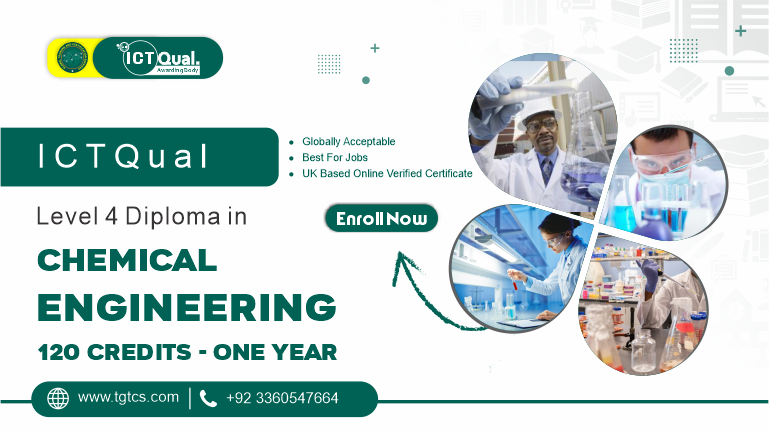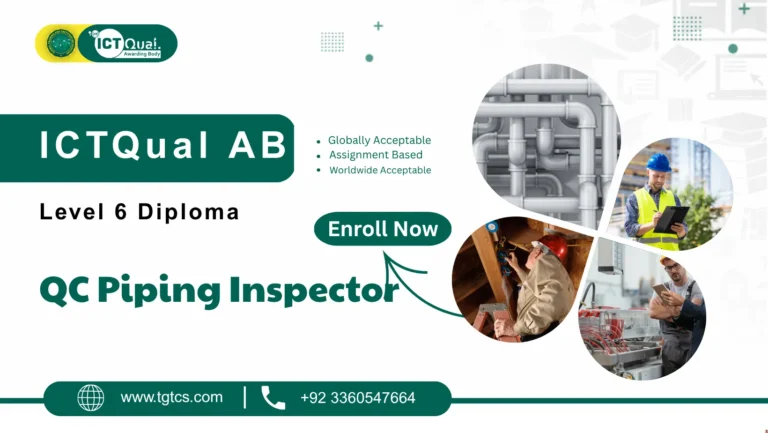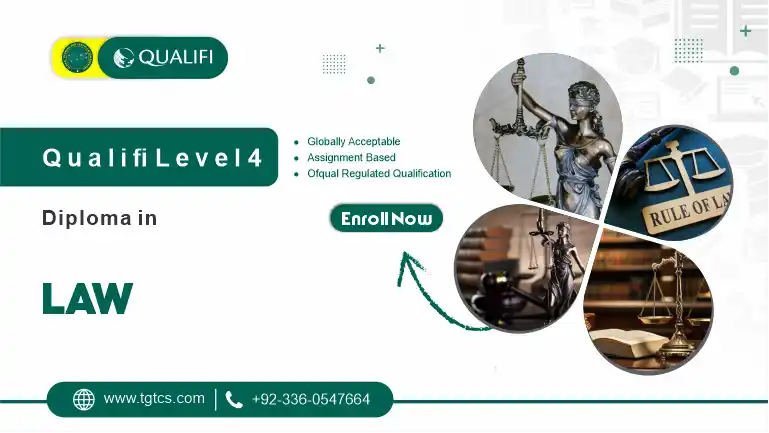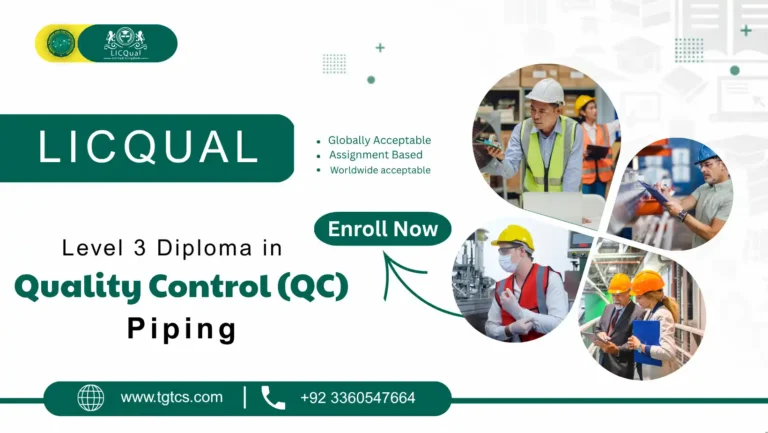ICTQual Level 4 Diploma in Chemical engineering 120 Credits – one year
The ICTQual Level 4 Diploma in Chemical Engineering is a specialized, one-year qualification designed to equip students with the essential skills and knowledge necessary to excel in the dynamic field of chemical engineering. With 120 credits, this advanced diploma provides a comprehensive understanding of core chemical engineering principles, preparing students for a wide range of careers in industries such as energy, pharmaceuticals, manufacturing, and environmental engineering.
The ICTQual Level 4 Diploma in Chemical Engineering is an academic program designed for those who want to gain a deep understanding of chemical engineering concepts and their practical applications in various industries. This one-year course is equivalent to the first year of a university degree and covers both theoretical and practical aspects of chemical engineering. With 120 credits, it provides students with a well-rounded education in core areas such as process engineering, materials science, thermodynamics, and fluid mechanics.
To enroll in the ICTQual Level 4 Diploma in Chemical Engineering, prospective students must typically have completed secondary education or hold an equivalent qualification. Some institutions may require prior knowledge in chemistry, physics, or mathematics. However, it’s not always necessary to have a background in engineering.
The ICTQual Level 4 Diploma in Chemical Engineering is a fantastic opportunity for individuals looking to pursue a career in chemical engineering. With its blend of theoretical knowledge and practical skills, this one-year course provides students with a solid foundation to excel in a rapidly growing and dynamic industry. Whether you want to work in energy production, pharmaceuticals, or environmental engineering, this qualification will give you the knowledge and experience needed to succeed.
The Global Training and Certification Services (TGTCS) is Directly Approved Training Centre of ICTQual
The ICTQual Level 4 Diploma in Chemical Engineering (120 Credits) is a one-year, advanced qualification designed to provide students with essential skills and knowledge in chemical engineering. Covering core subjects such as process engineering, thermodynamics, fluid mechanics, material science, and environmental engineering, this diploma offers both theoretical learning and practical experience. It is recognized internationally, making it a valuable credential for those seeking careers in industries like energy, pharmaceuticals, manufacturing, and environmental sustainability.
Upon completion, graduates can pursue roles such as chemical engineer, process engineer, and environmental engineer, with the potential for further studies in chemical engineering or related fields. The program is ideal for those looking to enter the field or advance their expertise, offering strong career prospects and global recognition.
Mandatory Units
The Units of Level 4 Diploma in Chemical Engineering 120 Credits – One Year are as ;
- Introduction to Chemical Engineering
- Process Heat Transfer
- Fundamentals of Chemistry for Engineers
- Fluid Mechanics for Chemical Engineers
- Mass Transfer Operations
- Chemical Reaction Engineering
- Materials and Process Selection
- Process Control and Instrumentation
- Environmental Engineering in Chemical Processes
- Chemical Engineering Thermodynamics
- Safety and Risk Management in Chemical Engineering
- Chemical Process Design Project
Here are the Learning Outcomes for each study unit in the ICTQual Level 4 Diploma in Chemical Engineering (120 Credits – One Year):
1. Introduction to Chemical Engineering (10 Credits)
Learning Outcomes:
- Understand the fundamental principles and concepts in chemical engineering.
- Describe the historical development of chemical engineering and its applications across various industries.
- Identify core areas such as process design, material handling, and system integration.
- Discuss the role of chemical engineers, with a focus on sustainability and ethical considerations in industrial settings.
2. Process Heat Transfer (10 Credits)
Learning Outcomes:
- Explain the mechanisms of heat transfer: conduction, convection, and radiation.
- Apply heat transfer principles to chemical process equipment like heat exchangers and boilers.
- Calculate heat transfer rates and choose materials for different thermal environments.
- Analyze energy balance in thermal processes and understand its impact on process efficiency.
3. Fundamentals of Chemistry for Engineers (10 Credits)
Learning Outcomes:
- Apply chemistry principles such as stoichiometry and thermodynamics to solve chemical engineering problems.
- Understand atomic structure, bonding, and molecular interactions relevant to engineering materials.
- Explain how thermodynamics and kinetics drive chemical reactions.
- Solve problems involving chemical equations, reaction rates, and material balances.
4. Fluid Mechanics for Chemical Engineers (10 Credits)
Learning Outcomes:
- Define key fluid properties and their relevance to chemical processes.
- Analyze fluid flow using principles like Bernoulli’s equation and the continuity equation.
- Design and calculate flow systems, including pumps and piping, for industrial applications.
- Assess the impact of viscosity, pressure, and temperature on fluid dynamics in various process environments.
5. Mass Transfer Operations (10 Credits)
Learning Outcomes:
- Explain the principles of mass transfer, including diffusion, convective mass transfer, and mass transfer coefficients.
- Design separation processes such as distillation, filtration, and absorption based on mass transfer principles.
- Use mathematical models to predict and optimize mass transfer in industrial processes.
- Evaluate and select suitable separation technologies based on material properties and process conditions.
6. Chemical Reaction Engineering (10 Credits)
Learning Outcomes:
- Understand the fundamentals of chemical reaction kinetics and rate laws.
- Analyze and design chemical reactors (batch, continuous) for optimal performance.
- Apply principles of catalysis and enzyme activity in industrial processes.
- Perform mass and energy balance calculations to size reactors and predict reactor behavior.
7. Materials and Process Selection (10 Credits)
Learning Outcomes:
- Identify and compare materials used in chemical engineering processes based on physical and chemical properties.
- Select materials for process equipment design, considering corrosion, wear, and thermal stress.
- Apply sustainability principles to material and process selection, reducing environmental impact.
- Evaluate the cost-effectiveness and performance of materials for specific applications.
8. Process Control and Instrumentation (10 Credits)
Learning Outcomes:
- Understand the role of process control and instrumentation in chemical engineering.
- Learn control loop dynamics, including feedback, feedforward, and PID controllers.
- Interpret instrumentation diagrams and understand sensors, actuators, and control systems.
- Apply process control principles to enhance the efficiency and safety of chemical processes.
9. Environmental Engineering in Chemical Processes (10 Credits)
Learning Outcomes:
- Understand the environmental impact of chemical processes and the role of engineers in pollution reduction.
- Analyze technologies for wastewater treatment, air pollution control, and waste management.
- Implement strategies for sustainable resource management in chemical manufacturing.
- Interpret environmental regulations and guidelines that govern industrial operations.
10. Chemical Engineering Thermodynamics (10 Credits)
Learning Outcomes:
- Apply thermodynamics laws to analyze energy systems in chemical processes.
- Understand phase equilibria and chemical equilibria in multi-component systems.
- Calculate thermodynamic properties and apply them to industrial chemical reactions.
- Solve problems involving energy conservation, entropy, and enthalpy changes in chemical processes.
11. Safety and Risk Management in Chemical Engineering (10 Credits)
Learning Outcomes:
- Identify and assess risks associated with chemical engineering processes.
- Apply safety standards and regulations to minimize accidents in chemical plants.
- Perform risk analysis and hazard identification using tools like HAZOP and FMEA.
- Develop emergency response plans and understand the importance of safety audits and compliance.
12. Chemical Process Design Project (10 Credits)
Learning Outcomes:
- Design a chemical process using material and energy balances, thermodynamics, and reaction engineering principles.
- Develop process flow diagrams (PFDs) and piping and instrumentation diagrams (P&IDs).
- Evaluate the economic, environmental, and safety aspects of the proposed process design.
- Present and defend design decisions in a professional project report and presentation.
These learning outcomes ensure that students gain both theoretical knowledge and practical skills needed to succeed in the field of chemical engineering. Each study unit builds on the previous one, helping students develop a well-rounded skill set that will serve them throughout their careers.
The ICTQual Level 4 Diploma in Chemical Engineering offers numerous advantages for students looking to establish a career in the field of chemical engineering. Here are some of the key benefits of enrolling in this one-year, 120-credit course:
1. Comprehensive and Industry-Relevant Curriculum
The course covers fundamental and advanced topics in chemical engineering, including process design, thermodynamics, fluid mechanics, chemical reaction engineering, environmental engineering, and more. The curriculum is designed to align with industry standards, ensuring that graduates are equipped with the skills and knowledge needed to succeed in real-world engineering roles.
2. Practical Skills Development
In addition to theoretical knowledge, students gain hands-on experience through laboratory sessions, process design projects, and simulations. This practical learning approach ensures that students develop the necessary skills to apply engineering concepts to solve real-world problems in industries like energy, pharmaceuticals, and manufacturing.
3. Global Recognition
The ICTQual Level 4 Diploma is internationally recognized, making it a valuable qualification for students looking to pursue chemical engineering careers globally. The diploma provides a solid foundation for those who wish to further their studies or work in multinational companies across various sectors.
4. Strong Career Opportunities
Graduates of this course are well-positioned to enter a variety of rewarding careers in chemical engineering. Potential job roles include chemical engineer, process engineer, materials scientist, environmental engineer, and more. The course prepares students for high-demand industries such as energy, chemicals, pharmaceuticals, and environmental sustainability, with strong job security and competitive salaries.
5. Pathway to Higher Education
The ICTQual Level 4 Diploma in Chemical Engineering serves as an excellent stepping stone for further education. After completing the diploma, students can pursue higher-level qualifications, such as a bachelor’s degree in chemical engineering or related fields, continuing their academic journey with advanced knowledge.
6. Industry Connections and Networking Opportunities
Studying this diploma allows students to connect with industry professionals, instructors, and fellow students, providing networking opportunities that can lead to internships, collaborative projects, and career growth. Many programs also have strong ties with industry partners, giving students direct exposure to the latest trends and technologies in chemical engineering.
7. Enhanced Problem-Solving and Analytical Skills
Throughout the course, students are trained to approach complex engineering challenges with analytical thinking and problem-solving techniques. From material selection and process optimization to safety management and risk assessment, students develop critical thinking skills that are essential for a successful engineering career.
8. Sustainability Focus
The course places a significant emphasis on sustainable engineering practices. Students are trained to consider the environmental impact of chemical processes and are encouraged to integrate sustainable solutions into their designs. This focus on sustainability is increasingly important in the modern industrial landscape, where environmental considerations are at the forefront of innovation.
9. Well-Structured and Flexible Learning Options
The ICTQual Level 4 Diploma offers flexible learning formats, including online and blended learning, allowing students to study at their own pace while balancing other commitments. The course structure provides a clear and progressive pathway, helping students build a strong foundation in chemical engineering.
10. Developed for Industry Needs
The diploma is designed with input from industry experts to ensure its relevance to current chemical engineering practices. It addresses the latest technological advancements and challenges in the field, ensuring that students are prepared to meet the demands of employers when they graduate.
11. Confidence in Safety and Risk Management
Students are taught crucial safety and risk management principles, ensuring they understand the importance of maintaining safe practices in chemical plants and industrial environments. This knowledge helps students to design and manage processes that meet strict safety standards and reduce potential hazards.
In summary, the ICTQual Level 4 Diploma in Chemical Engineering provides students with a solid, industry-aligned education, practical experience, and the opportunity to pursue exciting careers in chemical engineering. Whether you are looking to enter the workforce immediately or continue with further studies, this diploma offers numerous benefits that will set you up for success in the ever-evolving field of chemical engineering.
The ICTQual Level 4 Diploma in Chemical Engineering is designed for individuals who are passionate about pursuing a career in chemical engineering and are eager to acquire the practical and theoretical knowledge required to succeed in the industry. Here’s a breakdown of the ideal learner for this course:
1. Aspiring Chemical Engineers
The ideal learner is someone with a strong interest in chemical engineering and a desire to understand how chemical processes work in industries such as energy, pharmaceuticals, manufacturing, and environmental sustainability. If you are someone who is fascinated by how raw materials are transformed into valuable products through chemical processes, this course will provide the foundational knowledge and practical skills needed to enter the field.
2. Problem-Solvers with Analytical Mindsets
The course requires learners to approach challenges with a critical and analytical mindset. Ideal learners should enjoy problem-solving, be curious about how systems work, and have a natural inclination to understand and troubleshoot complex processes. Whether it’s designing chemical reactors, optimizing energy systems, or assessing safety risks, learners will need to apply logic and reason to devise solutions.
3. STEM Enthusiasts
Ideal learners often have a background in Science, Technology, Engineering, or Mathematics (STEM), especially in subjects such as chemistry, physics, and mathematics. A strong foundation in these areas is highly beneficial as the course covers complex topics like thermodynamics, fluid mechanics, and chemical reactions. While prior engineering experience is not mandatory, a passion for STEM subjects will help students grasp key concepts.
4. Those Interested in Sustainable Engineering Practices
Given the increasing demand for sustainable solutions in the chemical engineering sector, ideal learners are individuals who are committed to minimizing environmental impact and seeking innovative solutions to address global sustainability challenges. The course emphasizes sustainability, including environmental regulations, waste management, and sustainable resource management in chemical processes.
5. Those Seeking Career Advancement or Career Change
The ideal learner may be someone looking to advance their career in chemical engineering or shift from another related field into this industry. Whether you’re looking to build on your existing qualifications or transition into the field from a different area of engineering or science, this diploma provides a robust foundation to progress in chemical engineering.
6. Practical Learners
The ICTQual Level 4 Diploma is designed to combine theoretical knowledge with hands-on experience. Ideal learners are those who enjoy applying what they’ve learned in practical settings, such as designing chemical processes, conducting experiments, and analyzing data. If you thrive in practical environments and want to develop the skills needed to tackle real-world engineering challenges, this course is an excellent fit.
7. Self-Motivated and Independent Learners
While the course offers structured learning, ideal learners should be self-motivated and capable of managing their study schedule, especially if they are studying part-time or online. A proactive attitude toward learning, time management skills, and the ability to engage with both independent research and collaborative projects are key to succeeding in this course.
8. Students Planning to Pursue Further Education
The ICTQual Level 4 Diploma provides a pathway to higher-level education. Ideal learners may have aspirations to further their studies in chemical engineering or related fields. Whether you’re planning to pursue a bachelor’s degree, a master’s degree, or any advanced engineering qualification, this diploma provides the foundation for those further academic pursuits.
9. Career-Oriented Individuals
Ideal learners are motivated by strong career prospects. They are driven by the desire to secure well-paid, rewarding roles in the chemical engineering industry. This diploma opens doors to careers as chemical engineers, process engineers, environmental engineers, and other specialized roles in industries such as energy, pharmaceuticals, and manufacturing.
10. Collaborative Team Players
Although the course involves a significant amount of independent learning, ideal learners should also be effective team players, as many chemical engineering projects require collaboration. The ability to work well with others, share ideas, and contribute to group projects will be valuable in both the academic setting and in future professional roles.
In conclusion, the ICTQual Level 4 Diploma in Chemical Engineering is ideal for individuals who have a strong interest in chemical engineering, possess an analytical and problem-solving mindset, and are looking to either enter the field or advance their careers. Whether you are an aspiring engineer, a STEM enthusiast, or someone seeking to make a positive impact on sustainability through chemical engineering, this course offers the essential skills and knowledge to help you succeed in a dynamic and in-demand industry.
Progression Routes
The ICTQual Level 4 Diploma in Chemical Engineering (120 Credits – One Year) provides a solid foundation in chemical engineering principles, with a broad range of skills and knowledge applicable across various industries. Upon successful completion of the course, learners have several opportunities for further progression in both academic and professional pathways. Here are some potential options for students to consider:
1. Further Education and Academic Progression
- Level 5 Qualifications:
Graduates of the ICTQual Level 4 Diploma in Chemical Engineering may choose to pursue higher-level qualifications, such as a Level 5 Diploma in Chemical Engineering or a related field. This will deepen their understanding and further specialize their skills in specific areas such as process design, environmental engineering, or advanced thermodynamics.
2. Professional Development and Career Progression
- Graduate Chemical Engineer:
After completing the Level 4 diploma, students can enter the workforce as Graduate Chemical Engineers, working in industries such as oil and gas, pharmaceuticals, food processing, water treatment, and petrochemicals. They may work in roles such as process design engineer, operations engineer, production engineer, or process optimization specialist. - Process Engineer:
Graduates can take on Process Engineer roles, where they will be responsible for designing, testing, and optimizing chemical processes. This role requires a deep understanding of chemical reaction engineering, thermodynamics, and process control, all of which are covered in the diploma. - Environmental and Sustainability Engineer:
Students with a strong interest in environmental issues can progress into environmental engineering roles, where they apply chemical engineering principles to minimize environmental impact. This includes working in areas like wastewater treatment, waste management, and pollution control. - Health, Safety, and Risk Management:
Given the focus on safety and risk management in the course, graduates can progress into careers in health and safety management, focusing on ensuring safety standards are met in chemical plants, factories, and production facilities. - Chemical Process Consultant:
Graduates can also work as consultants in the chemical engineering sector. In this role, they would advise companies on process improvements, efficiency, sustainability, and regulatory compliance. Consulting allows professionals to specialize in niche areas, such as clean energy technologies or hazardous material management.
3. Industry Certifications and Memberships
- Chartered Engineer Status (CEng):
With further work experience and academic qualifications (such as completing a bachelor’s degree or an accredited Level 5 diploma), graduates may aim to achieve Chartered Engineer (CEng) status through professional bodies like the Institution of Chemical Engineers (IChemE). This prestigious certification enhances career prospects and recognizes a high level of professional competence. - Project Management Certifications:
Graduates interested in project management within the chemical engineering field may pursue certifications such as Project Management Professional (PMP) or Prince2, which would allow them to lead and manage large-scale projects in chemical production or process design. - Environmental and Sustainability Certifications:
Chemical engineers interested in the sustainability sector may also look into specialized certifications in sustainable engineering, environmental impact assessment, or green chemistry to further build their expertise and contribute to the development of eco-friendly technologies.
4. Entrepreneurship and Startups
- Entrepreneurship in Chemical Engineering:
The ICTQual Level 4 Diploma also provides the technical knowledge required for graduates to pursue entrepreneurial opportunities. For those with a business mindset, chemical engineers can launch their own engineering consultancy firms or tech startups focused on developing innovative solutions in fields such as renewable energy, waste-to-energy technologies, or the development of new chemical products.
5. Specialized Areas for Advanced Study or Research
- Advanced Topics in Chemical Engineering:
Graduates may also specialize in specific, advanced areas such as nanotechnology, biotechnology, or pharmaceutical engineering by pursuing additional study and research, either through a master’s program or by gaining experience working in high-tech industries. - Sustainability Engineering:
The growing emphasis on environmental sustainability means that graduates with a chemical engineering background can pursue specialized careers focused on green chemistry, sustainable manufacturing, and renewable energy systems.
Course Overview
Course Level
Level 4
Course Units
12 Mandatory Units
Duration
one year






